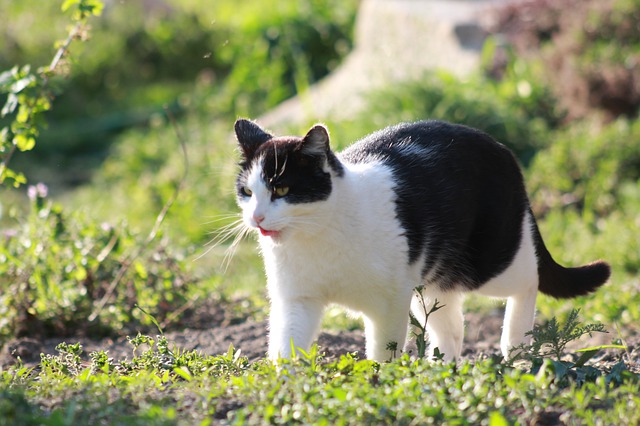Essential oils are famous for their use in alternative medicine and aromatherapy.
Made from concentrated scents of various plants, flowers, and herbs, they offer many health benefits including mood-boosting abilities, pain relief, stress relief, and use as digestive aids.
While essential oils offer plenty of bets, they can also be harmful especially around our pets.
Rosemary essential oil is celebrated worldwide for its many benefits. Folks use it to reduce inflammation in their joints, alleviate stress, repel bugs, improve brain function, and reduce pain. Its ease of use makes it a favorite of many.
For our feline friends, rosemary oil is said to keep fleas and mosquitoes at bay. But how safe is it around your pets – specifically your cat?
The Danger Of Essential Oils For Cats In General

Pet Poison Helpline strongly recommends against using essential oils near cats. The reason is that cats do not possess the right liver enzymes to metabolize them.
What this means is that the kitty’s liver can’t eliminate toxins from it. So, if your cat accidentally or intentionally ingests, inhales, or is exposed to essential oil, her system will not be able to handle it.
The notorious toxins are phenols and phenolic compounds which have a benzene ring. Unfortunately, many essential oils have these compounds and may become fatal if consumed by the kitty.
Because of their size, essential oils pose a greater danger for cats in comparison to dogs. Even the smallest amount can affect your kitty.
Plus, these little creatures cannot avoid scratching themselves as a way of grooming. Consequently, they increase the chance of consuming essential oils orally as they lick themselves.
The other problem with essential oils is that they cause respiratory irritation to cats which can, in turn, cause a burning sensation in the nose and throat. Cats’ respiratory systems are very sensitive and can easily develop respiratory distress if they inhale the wrong substances.
Is Rosemary Essential Oil Toxic For Cats?

The Canadian Veterinary Medicine Association (CVMA) is among the many animal organizations that do not support the use of essential oils around cats. According to them, rosemary essential oil alongside other oils such as clove, bergamot, cinnamon, ylang-ylang, geranium, wintergreen, tea tree oil, mint, peppermint, spearmint, thyme, and others are toxic to cats.
VCA Hospitals doesn’t list rosemary essential oil as a toxic agent to cats. Its list includes citrus, cinnamon, pine, sweet birch, tea tree, ylang-ylang, wintergreen, pennyroyal, and wintergreen.
As usual, it is better to err on the side of caution when it comes to your pets. Just to avoid any trouble, consider doing away with the oil when your cats are around. That includes applying it on your kitties, diffusing it,adding it to bathwater, using it as a shampoo, or utilizing it in a humidifier.
Symptoms Of Essential Oil Poisoning In Cats
When a cat is exposed to rosemary essential oil through inhalation, your cat will suffer respiratory distress. Common symptoms include heavy breathing, wheezing, watery eyes and nose, vomiting, and drooling.
Difficult breathing can be mistaken for the expulsion of a hairball. However, you know your cat is having trouble breathing if she crouches to the ground and doesn’t move her abdomen or remove any hairball.
Other symptoms include diarrhea if ingested, seizures, weakness, and lethargy.
The minute you notice any of these symptoms, rush the kitty to an area with fresh air. Next, call the vet and let them advise you on how to proceed.
Additional Tips

With essential oil, the concentration, amount exposed, underlying medical conditions (or lack thereof), and the mode of use have an effect on the toxicity. For example, if your kitty is exposed to rosemary oil of 100% concentration, she will suffer more than if you exposed her to a concentration of 20%.
If you must use rosemary oil at home, here are a few safety tips to consider.
- Avoid applying concentrated essential oils on your cat: Whether your feline friend has an underlying medical issue or not, you should never apply a concentrated essential oil on her skin.
- If your cat has allergies or asthma, don’t attempt to diffuse or apply rosemary oil on her. This is because diffusers cause the oils to become airborne droplets that can become fatal fast.
- Offer routes of escape: When diffusing rosemary essential oil at home, make sure your cat can leave the room when the scent or heat becomes too much for her.
- Keep essential oils out of your pets’ reach: If you have rosemary oil at home, ensure the containers, warmers, and diffusers are kept away from the cat.
Rosemary oil may truly be beneficial for both man and animal but if it compromises the health of your cat, it should not find its way home. Other safer alternatives can be used in the place of essential oils. If you must use it around your cat, exercise the aforementioned cautionary tips.
Related Posts:

Hi! I am Eleanor Price. I started this website after my cat, Louie, almost died from a case of botulism (a type of food poisoning often caused by bacteria that grow on food items). Turned out that my cat’s diet was the problem. I have made it my duty to provide the best information and recommendations about everything cat lovers need to know about their felines’ health and wellbeing. My goal is to find the most informative content on anything feline-related and share it with fellow hardworking kitty lovers.

